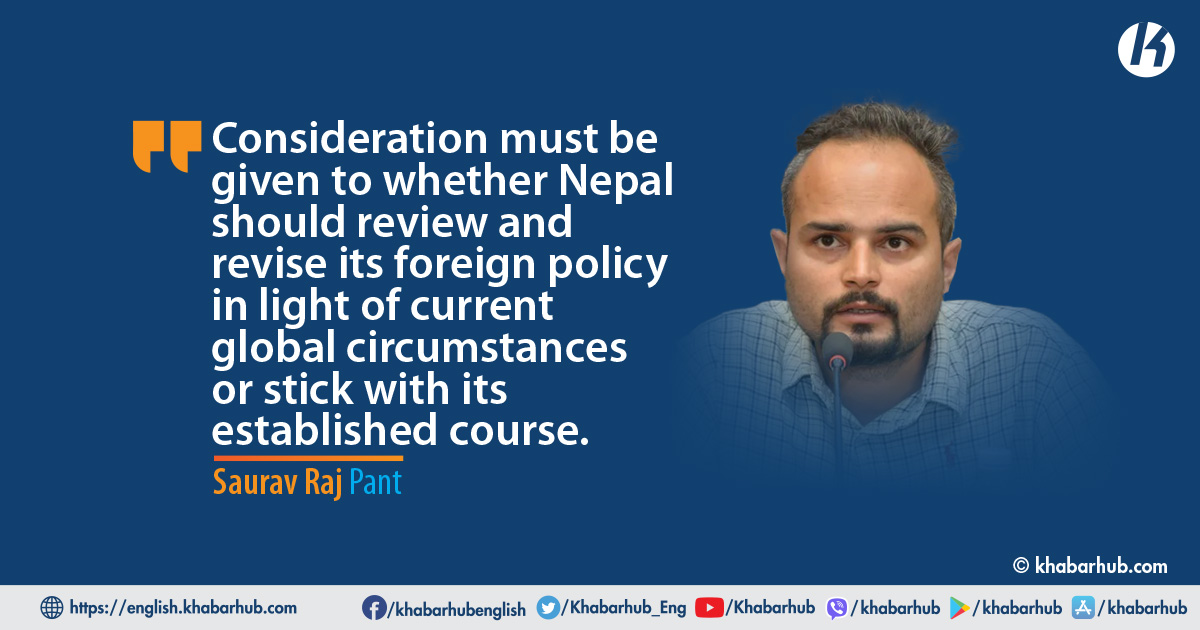Nepal is in a position where it must carefully consider its options on both the Chinese and the Indo-Pacific lobbying fronts.
Due to the engagement of powerful nations like India and the West spearheading the Indo-Pacific lobby, as well as China’s historical links and strategic importance for Nepal, the nation is in a difficult situation.
As Nepal strives to handle the challenges from both India and China, its non-aligned foreign policy, which has been a core component of its diplomatic strategy, is being tested.
As Nepal tries to achieve a careful balance between these two conflicting pressures, this poses serious problems for the country.
Every initiative the nation undertakes runs the danger of being classified as either Chinese or Indian, reflecting the continuous geopolitical competition for control in the area.
Indo-Pacific Lobbying Front versus Chinese Lobbying Front
On the one hand, Nepal is significantly influenced by the Indo-Pacific lobbying front, which is led by the US and backed by India.
Nepal’s relations with India have historically been affected by factors such as closeness to each other geographically, common cultural links, and economic collaboration.
Nepal is obligated to carefully handle its relations with China and India in spite of the extensive linkages with these areas of public.
The linkages are further strengthened by the fact that many Nepali residents have personal contacts through employment and educational possibilities in the West and India.
As a result, the majority of Nepalis have a positive opinion of the West and India( always complicated but unavoidable) and see them partner in contributing towards Nepal’s development.
On the other hand, it is impossible to ignore China’s presence in Nepal. China and Nepal have long had cordial relations, and China has grown in importance as a trading partner for Nepal.
Recently, Airports and hydroelectric power plants are one of the two examples of the infrastructure projects in Nepal in which China has financed; that made India frustrated because India saw Dragon dancing in the Himalayas.
But as the US-China Cold War intensifies, Nepal is caught in the middle as both China and India strive to impose their will on the nation.
The Chinese side pressures Nepal to join initiatives like the Global Security Initiative (GSI), which can be seen as China’s version of NATO, as well as the Global Development Initiative (GDI) and Global Civilization Initiative (GCI), while the Indo-Pacific lobbying front significantly supports our military, Development projects and concessional loans.
However, because joining the GSI conflicts with our isolationist foreign policy, Nepal has already rejected invitations to take part in the State Partnership Program (SPP) of the United States.
As a result, the list of initiatives that lure Nepali leaders is becoming into the new standard, but Nepal’s shaky structure places the nation in a challenging situation to handle the turbulence made by elephants in the room.
Nepali State versus Public
Since 1990’s, the Nepali has developed close ties with several nations, especially those in West Asia, the US, UK, Canada, Australia, South Korea, and Japan.
Finally, Nepal must carefully negotiate the dynamics between the Chinese lobbying front and the Indo-Pacific lobbying front as it stands at a crucial crossroads.
These links span a variety of areas, including economic cooperation, employment possibilities, cultural interaction, and education, increasing exposure to these countries’ beliefs, values, and ways of life.
The state of Nepal is obligated to carefully handle its relations with China and India in spite of the extensive linkages with these areas of public.
This is brought about by a variety of variables, such as geopolitical concerns, historical relationships, and economic interests.
The geopolitical placement of Nepal between these two next-door superpowers makes choosing its foreign policy even more difficult; while its public is becoming radically anti-establishment and populist.
It should be underlined that Nepal’s migration trend shows a negligible presence of Nepalese people and constrained remittance flows from communist bloc nations, with China serving as a prominent example.
The majority of remittance flows and thriving diasporas are primarily seen in Western or West Asian countries, which are generally in line with democratic lobbying.
In addition, Western lobbying nations are principally responsible for the development agencies (like USAID, UKAID, NORAD), World Bank Group(WBG), International Monetary Fund(IMF) and Asian Development Bank’s providing of concessional loans for Nepal’s growth.
Conclusion
This makes the dangers for Nepal; confronting in balancing the conflicting influences from India and China, the difficulties facing Nepal’s non-aligned foreign strategy become clear.
The categorization of projects as either Chinese or Indian reflects the continuous competition for supremacy between these two powerful nations.
The geopolitical factors at play are further highlighted by the labeling that has previously been seen in Nepali airports and hydro projects.
Because of Nepal’s ties and geographic location, the current Cold War between China and the US varies from the one between the Soviet Union and the US that preceded it.
In the past, Nepal did not share any geographical borders or direct ties with either the US or the USSR.
However, the current circumstance is unique since China, a significant participant in the continuing turmoil between the United States and China, and Nepal share a land border.
The dominant impact of Western soft power, particularly that of the United States, is crucial in determining the attitudes, ambitions, and expectations of Nepali society.
Numerous facets of Nepalese society, including the media, entertainment, education, consumer tastes, and even political debate, are clearly affected.
Bigger than that, large chunk of remittance is being received from the West Asia and West.
Consideration must also be given to whether Nepal should review and revise its foreign policy in light of current global circumstances or stick with its established course while increasing its leadership capacity to meet difficulties. The debate ‘MUST’ start.
With their significant worldwide impact, the United States and the Western world have successfully projected their cultural, economic, and political principles, which have greatly increased in favor and acceptability among the Nepali population.
Finally, Nepal must carefully negotiate the dynamics between the Chinese lobbying front and the Indo-Pacific lobbying front as it stands at a crucial crossroads.
While China’s presence and investments cannot be ignored, the Indo-Pacific lobby, which is led by major nations like India and the West, has a huge impact on Nepal.
The categorization of projects as either Indian or Chinese underlines the difficulties faced in handling these conflicting forces. Nepal’s non-aligned foreign policy is under threat.
Nepal will be compelled to pick a side in the US-China Cold War whether to join the Indo-Pacific Lobbying Front or the Chinese Lobbying Front, raising questions about how it would defend its sovereignty and national interests amid these intricate geopolitical forces.
Consideration must also be given to whether Nepal should review and revise its foreign policy in light of current global circumstances or stick with its established course while increasing its leadership capacity to meet difficulties. The debate ‘MUST’ start.
(Note: To fix grammatical errors and adjust clarity, the writer has opted help from ChatGPT and other AI platforms. The writer, hereby, declares that the idea is original of the writer itself.)









Comment